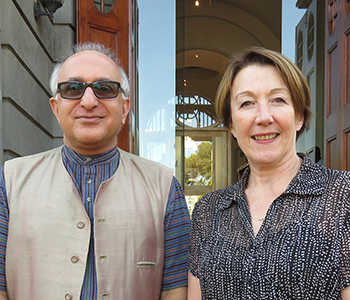Latest News Archive
Please select Category, Year, and then Month to display items
13 January 2020
|
Story Eugene Seegers
|
Photo Anja Aucamp
 Spearheading the digital expansion of the conversational Sesotho course is IDEAS Lab Director, Johann Möller (middle). With him are from the left: Prof Pule Phindane, CUT; Dr Brenton Fredericks, CUT; Bahedile Letlala, UFS Department of African Languages; and Dr Elias Malete, UFS Department of African Languages.
Spearheading the digital expansion of the conversational Sesotho course is IDEAS Lab Director, Johann Möller (middle). With him are from the left: Prof Pule Phindane, CUT; Dr Brenton Fredericks, CUT; Bahedile Letlala, UFS Department of African Languages; and Dr Elias Malete, UFS Department of African Languages.
For many years now, the UFS has been offering a one-year course in conversational Sesotho for staff members; this can then be followed up with the one-year course in advanced conversational Sesotho. The conversational Sesotho for students in the Faculty of Education was introduced in 2018 at the UFS.
The Central University of Technology (CUT) needed a conversational course for its first-year students and approached the Department of African Languages for the development of such a course. Living as we do in a multilingual country; this additional language skill opens doors and often hearts as well.
Using instructional design principles
However, the need was identified by both CUT and UFS to present this crucial information in a way that would be more appealing to digital natives as well as to those less familiar with technology. The Department of African Languages on the UFS Bloemfontein Campus, together with relevant departments from the CUT, approached the IDEAS Lab located on the UFS South Campus, since they already have a reputation for being a specialist on broadcasting and repackaging curricular content for digital presentations. The IDEAS Lab provided technical advice and built the multimedia programme, which will help the user to hear and practice phrases in Sesotho, using instructional design principles. The course will be available to both staff and students belonging to the two universities.
Room for growth
Johann Möller, Director of the IDEAS Lab, says this pilot programme will give both institutions the opportunity to test the use of multimedia for language acquisition. He adds, “Language is extremely complex, and we would like to expand this learning aid in the future.” In fact, the original design has room for growth built into it.
To keep things simple for the user and the building team, it was decided to start out with only four potential everyday scenarios where a staff member would like to speak Sesotho: Firstly, how to greet other persons from different genders; secondly, potential scenarios one might encounter in the university environment itself; thirdly, how to deal with situations at a hospital; and finally, how to use one’s language skills at a filling station.
Pronunciation is key
Each scenario contains three to four conversations that the learner can revise, along with images and audio that illustrate the situation and assist with correct pronunciation. The system does not allow the user to progress unless they have listened to the pronunciations of the sample sentences or phrases.
Further reading material and vocabulary lists are also provided, with the result that people who are using the programme can learn at their own pace. The authoring software Articulate Storyline was used to build the individual scenarios and each conversation or lesson within it. The lessons are also not dependent on an internet connection; they can be downloaded onto a flash memory drive and used offline.
Andrew Mellon Foundation renews ongoing support for UFS projects
2017-04-10
 Dr Saleem Badat and Annemia van der Heever.
Dr Saleem Badat and Annemia van der Heever.The University of the Free State (UFS) was first awarded a grant by the Andrew W Mellon Foundation (AWMF) in 2015 to fund several projects between 2015 and 2016 under the International Higher Education Strategic projects fund. The programme’s director, Dr Saleem Badat, visited the UFS on 23 March 2017 as part of his annual first-quarter feedback sessions, with not only the UFS but other universities around the country that benefited from the programme. Top of the agenda was a meeting with principal investigators of projects funded by the foundation, to discuss the UFS’s institutional priorities for funding, alongside the university’s management, to discuss possible intra-institutional projects to be undertaken with other universities.
During his visit, Dr Badat met with Prof Nicky Morgan, UFS Acting Vice-Chancellor and Rector, as well as the AWMF representative, Annamia van der Heever, Director: Institutional Advancement. He discussed future plans with managers of the Programme for Innovation in the Artform Development, #Movements project, Inclusive Professoriate Grant and the Curriculum reform programme which involved seven other universities.
The AWMF, through its projects, is instrumental in developing and maintaining strong higher education institutions that produce knowledge and high-quality graduates, and advances social justice. The projects further aim to deepen and broaden public understanding and support for the arts and humanities, diversity and inclusion. “The Foundation each year presents universities with wonderful opportunities to improve teaching, learning and research in the humanities. We are working hard with the Faculty of Humanities on possible submissions for 2017,” said Van der Heever.
During 2017 between $10.8 million and $12 million will be available for grants by the Foundation’s International Higher Education and Strategic Projects programme. The Vice-Chancellor’s Office will continue to serve as a contact point and administrative support for UFS projects currently funded by AWMF. Institutional Advancement will assist project leaders to draft submissions to the Foundation this year and in the future. In 2018 AWMF will celebrate 30 years of involvement in supporting higher education in South Africa.